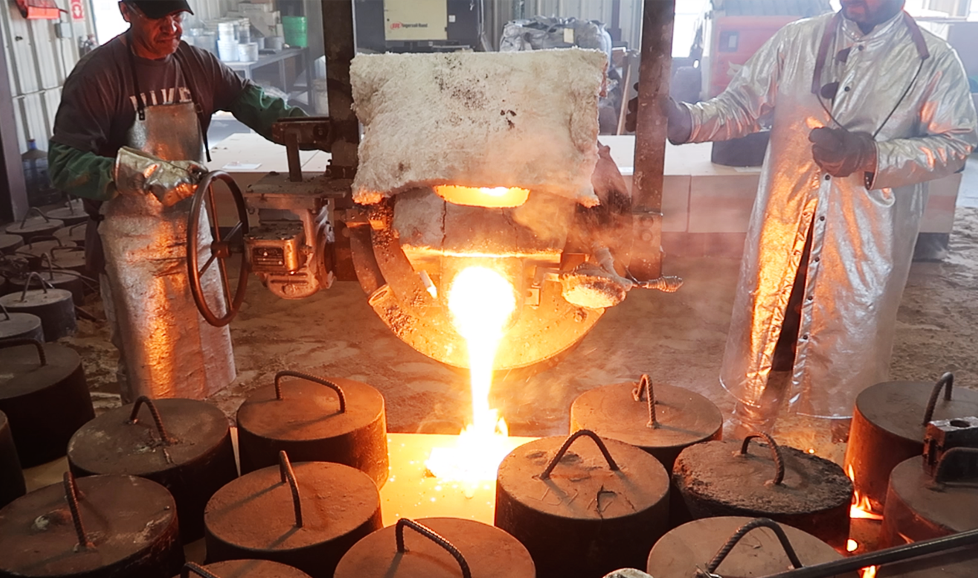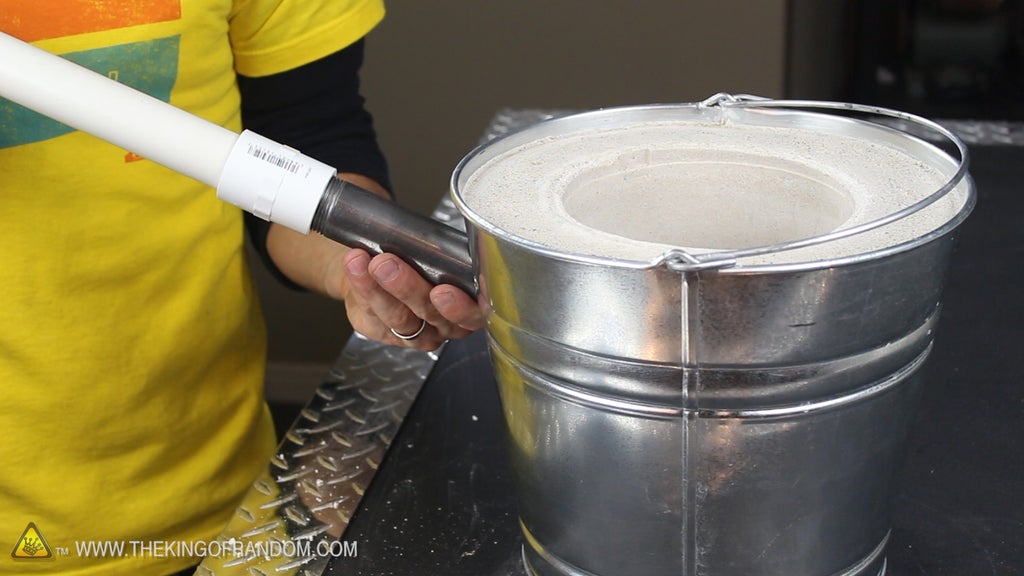Aluminum Casting Explained: Methods for Modern Component Production
Wiki Article
A Comprehensive Guide to Metal Casting: Advantages and Services Supplied by Foundries
Metal casting is an essential procedure in different industries, using numerous advantages through the solutions of foundries. These centers change molten metal into specific and resilient components, catering to particular client demands. By using sophisticated modern technologies, foundries ensure quality and effectiveness in manufacturing. The details of metal casting and the diverse methods involved elevate important inquiries about its duty in contemporary production. What technologies exist in advance in this important area?Comprehending the Metal Casting Process
The metal casting process is a fundamental technique utilized in manufacturing to create complex shapes and parts. This method includes putting liquified metal right into a mold created to develop the preferred item. The process begins with pattern creation, which acts as a template for the mold and mildew. Metal Foundry. Various products, such as sand, metal, or ceramic, are made use of for mold-making, relying on the certain needs of the casting
As soon as the mold and mildew is ready, molten metal is put right into it and enabled to strengthen and cool down. After solidification, the mold and mildew is gotten rid of, exposing the cast component. Numerous methods, including sand casting, financial investment casting, and pass away casting, are utilized, each matched to various applications and materials. Quality assurance actions, such as examinations and screening, are vital to ensure the last item meets requirements. Generally, the metal casting process plays an important duty in creating components for markets ranging from vehicle to aerospace.
Key Advantages of Metal Casting
Metal casting offers significant benefits that make it a preferred production method in numerous industries. Its layout flexibility and accuracy enable for intricate forms, while cost-effective automation enhances effectiveness. Additionally, the adaptability and strength of materials utilized in casting add to the toughness of the final products.Layout Flexibility and Accuracy
Launching amazing layout adaptability and precision, metal casting enables designers and designers to create elaborate forms and features that would be difficult or difficult to achieve with other producing approaches. This capacity enables the manufacturing of complicated geometries, internal frameworks, and fine details that enhance product capability and appearances. Additionally, various casting methods, such as sand casting, financial investment casting, and die casting, provide additional alternatives for personalization, suiting varied material properties and project requirements. The versatility of molds permits adjustments throughout the style stage, improving the change from principle to last item. Inevitably, metal casting stands out for its ability to deliver high-precision components, making it an invaluable process in industries ranging from automotive to aerospace and beyond.Cost-Effective Mass Production
Cost-effective automation stands as one of the primary benefits of metal casting, enabling manufacturers to generate huge amounts of elements at a lower cost per unit. This efficiency arises from the capacity to develop complex molds that can be reused numerous times, substantially lowering configuration and operational costs. In addition, metal casting procedures, such as sand casting and die casting, permit high throughput, making it feasible to fulfill the demands of large-scale manufacturing runs. The minimized material waste and power usage even more boost price savings, making metal casting an attractive alternative for markets needing mass elements. Overall, the cost-efficient nature of metal casting settings it as a preferred approach for producers aiming for financial efficiency in their manufacturing processes.Product Adaptability and Strength
Among the standout attributes of metal casting is its exceptional product adaptability, which enables making use of a vast array of steels and alloys. This versatility enables makers to select products that best fit their specific applications, from aluminum and bronze to iron and steel. Each metal supplies distinct homes, consisting of varying degrees of toughness, rust resistance, and thermal conductivity. Metal casting can produce elements that satisfy rigorous performance demands throughout varied industries, such as automobile, aerospace, and building and construction. Additionally, the stamina of actors steels can be boosted via various treatment processes, making sure longevity and longevity. Aluminum Casting. Overall, the combination of material adaptability and intrinsic toughness makes metal casting a recommended selection for generating premium partsKinds Of Metal Casting Strategies
Metal casting encompasses a variety of techniques that cater to different manufacturing needs and product homes. Usual approaches consist of sand casting, which uses a sand mold and mildew for complicated shapes, and investment casting, known for its precision and surface finish. Die casting is another strategy that uses high-pressure shot of molten metal into molds, perfect for mass manufacturing of little parts.Shell molding offers a much faster different, utilizing a resin-coated sand to produce thin-walled molds, while shed foam casting permits complex designs without the demand for a core.
In addition, constant casting is used for producing lengthy areas of metal, such as bars or sheets, by strengthening liquified metal in a continuous procedure. Each method provides unique benefits and is chosen based upon aspects like the required information, production quantity, and product type, ensuring premium results in metal fabrication throughout different industries.
The Function of Foundries in Metal Casting
Foundries play a crucial function in the metal casting process, acting as the facilities where liquified metal is transformed right into completed items. These specialized establishments are outfitted with the needed devices and innovations to handle different steels, making sure top quality end results. Factories are liable for several essential functions, consisting of melting the metal, putting it into molds, and enabling it to solidify.Furthermore, they keep strict security and ecological standards to shield employees and minimize ecological impact. Knowledgeable technicians and engineers collaborate to maximize casting processes, enhancing effectiveness and minimizing waste. Factories additionally participate in high quality control actions, guaranteeing that the last items fulfill specific tolerances and specs. This quality control is essential for industries that rely upon accurate elements, such as vehicle and aerospace. As an outcome, shops add substantially to the overall manufacturing landscape, enabling innovation and growth across various fields.
Personalized Metal Casting Providers
Custom metal casting solutions supply customized design solutions that meet specific customer needs. These services also supply product option proficiency, making sure the right metal is chosen for the wanted application. Such adaptability and expertise improve the overall quality and efficiency read here of the last product.
Tailored Layout Solutions
Tailored layout services in metal casting give producers with the adaptability to create elements that satisfy specific performance and visual requirements. Factories supply customized solutions that permit clients to specify measurements, forms, and surface finishes to attain wanted outcomes. This modification procedure frequently consists of cooperation between developers and engineers, making certain that the final products line up with functional demands and industry standards. Advanced innovations, such as computer-aided layout (CAD) and simulation software program, enable accurate modeling and screening of components before production, enhancing and reducing errors effectiveness. By leveraging customized style remedies, companies can enhance performance while minimizing waste and prices, inevitably bring about an extra one-upmanship in the market. This adaptability is important for markets calling for one-of-a-kind applications and requirements.Product Option Proficiency
When selecting materials for metal casting, proficiency plays an important role in ensuring that the right choice lines up with both performance requirements and cost-effectiveness. Foundries use skilled professionals that recognize the properties of numerous steels and alloys, allowing them to recommend excellent materials for specific applications. Variables such as toughness, rust resistance, and thermal conductivity are thoroughly considered to fulfill the client's needs. In addition, market trends and innovations in material scientific research notify these choices, allowing foundries to remain competitive. By leveraging their expertise, shops can assist customers in steering via facility material alternatives, eventually leading to boosted product top quality and decreased manufacturing expenses. This customized understanding is essential for accomplishing successful end results in customized metal casting solutions.Quality Assurance in Metal Casting
Quality assurance in metal casting is important to assure that the end products meet the needed requirements and performance criteria. Shops use a variety of methods and methods to guarantee the highest possible quality of cast components. This process starts with stringent material evaluations, validating that raw materials conform with sector standards. Throughout the casting process, real-time surveillance and screening are conducted to evaluate specifications such as temperature level, mold integrity, and dimensional accuracy.
Applications of Metal Castings Throughout Industries
Metal castings play a crucial duty in various sectors, functioning as the foundation for numerous applications. In the auto market, cast components such as engine blocks and transmission real estates are necessary for automobile performance and dependability. The aerospace industry depends on accuracy castings for important elements that assure safety and performance in flight. Furthermore, the construction market makes use of metal castings for fixtures, installations, and architectural components, enhancing the longevity of buildings and facilities.The energy industry advantages from spreadings used in turbine blades and other devices crucial for power generation. The medical field likewise uses metal spreadings in tools and instruments, demonstrating the flexibility of this manufacturing procedure. On the whole, metal spreadings are integral to the functionality and development of diverse markets, showcasing their value in contemporary innovation and framework development
Frequently Asked Questions
What Materials Are Commonly Used in Metal Casting?
Common materials used in metal casting include aluminum, iron, steel, bronze, and brass. Each material supplies unique residential or commercial properties appropriate for different applications, enabling producers to choose the very best option based upon toughness, weight, and deterioration resistance.How much time Does the Metal Casting Process Generally Take?
The metal casting process commonly takes numerous hours to a few days, depending on variables such as the complexity of the design, sort of metal made use of, and the certain casting method used by the factory.
What Is the Environmental Influence of Metal Casting?
The environmental influence of metal casting includes energy usage, emissions, and waste generation. Shops typically implement actions to minimize these impacts, such as reusing materials and making use of cleaner innovations to reduce their environmental footprint.Can Metal Casting Be Provided For Small-Scale Projects?
Metal casting can indeed be done for small-scale jobs. Various factories deal with such demands, using personalized solutions that suit minimal manufacturing get more runs while maintaining high quality and precision in the last items.What Are the Precaution in Metal Casting Foundries?
In metal casting factories, safety and security measures include individual safety equipment, appropriate air flow, training on equipment use, emergency situation treatments, regular upkeep checks, and adherence to industry security criteria to minimize dangers linked with liquified metal and hazardous materials.Furthermore, metal casting procedures, such as sand casting and pass away casting, allow for high throughput, making it possible to satisfy Our site the needs of large production runs. One of the standout features of metal casting is its remarkable material adaptability, which permits for the usage of a wide range of alloys and metals. Furthermore, constant casting is used for generating lengthy areas of metal, such as sheets or bars, by solidifying molten metal in a continuous process. Factories play an essential function in the metal casting procedure, serving as the facilities where molten metal is transformed into finished items. Usual products used in metal casting include aluminum, iron, steel, bronze, and brass.
Report this wiki page